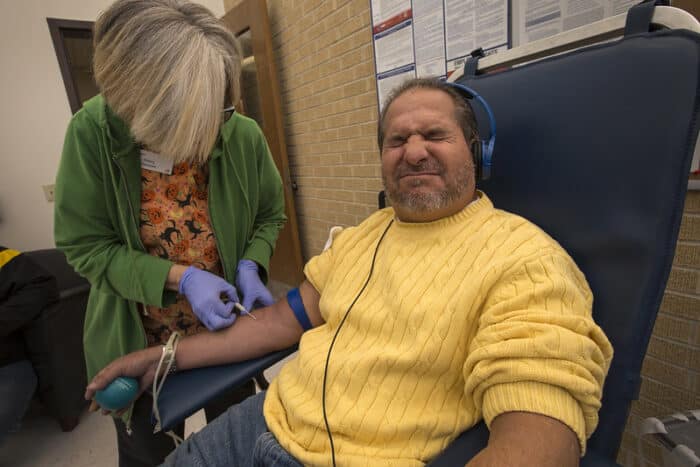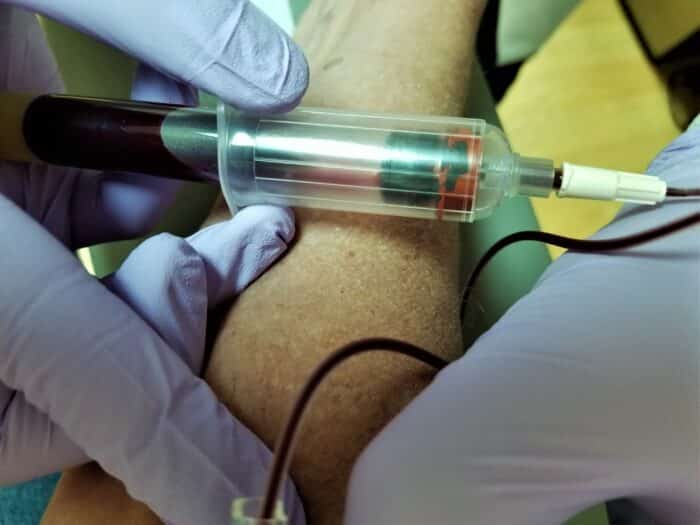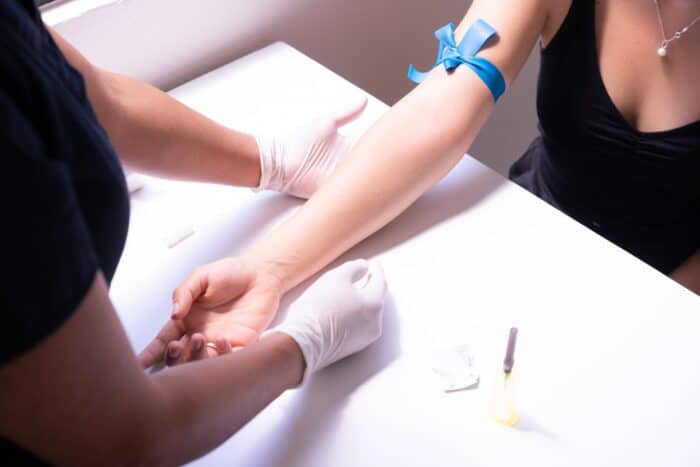Have you ever wondered where you can work as a phlebotomist?
Or are you an aspiring phlebotomist trying to find the different industries that you can work in?
We’ve got you covered with answers to all of those, and more.
In this article, let’s explore more about where these unsung heroes can work.
So, let’s dig in.
Also see: What is a Phlebotomist
Read: How to Become a Phlebotomist

Do You Want To Become a Phlebotomist? Check Out Free Phlebotomist Masterclass!
In our masterclass you learn:
- How to be a Phlebotomist faster…in just 2 months!
- Avoid student debt & driving to classes
- #1 thing employers want from Phlebotomists
- How to stand-apart & get a university certificate for a strong resume
Top Places That Hire Phlebotomy Techs
Phlebotomy is a versatile career, which offers you the opportunity to work in a variety of industries.
Let’s discover which industries you can work in as a phlebotomist:
Hospitals:
Hospitals are where the action unfolds for many phlebotomists, with approximately 36% of them calling these bustling healthcare hubs their workplace, according to the Bureau of Labor Statistics (BLS).
Hospitals come in all shapes and sizes, from state and local institutions to private medical centers. Here, you’re rubbing shoulders with a diverse cast of medical professionals, offering you a golden opportunity to learn from the best.
Plus, the hands-on experience and knowledge you gain in a hospital can be your stepping stone to a broader healthcare career, whether you aspire to be a nurse, laboratory technician, or medical assistant.
Medical and Diagnostic Labs:
Ever wanted to play a role in the mysterious world of lab coats and test tubes? Well, medical and diagnostic laboratories are where you can make that happen.
These labs are the second-largest employers of phlebotomists, as per the BLS. Here, your primary mission is to draw blood samples, analyze urine specimens, and handle various types of samples following strict laboratory protocols.
It’s a quieter, more methodical work environment compared to the hustle and bustle of a hospital. Working in a lab allows you to work behind the scenes, providing crucial data and insights to doctors.
Doctor’s Offices:
At a doctor’s office, you’re the blood-drawing specialist. Your role involves drawing blood from patients scheduled for routine testing or in need of a transfusion. The patient mix can vary depending on the type of doctor’s office.
For instance, if you’re in a pediatrician’s office, your patients will be little ones. Working at a doctor’s office is usually less hectic and less demanding than at a hospital.
Outpatient Care Centers:
If you’re someone who enjoys being on the move, outpatient care centers might be your calling. In this role, you’ll work at different locations regularly.
Your job will require you to travel to various physicians’ offices and medical care facilities throughout the day to carry out your duties. It’s an adventure that takes you places, and you must be comfortable with diverse situations that arise.
Emergency Clinics:
Emergency clinics are like the epicenter of phlebotomy settings. This job isn’t for the faint of heart because it often involves working overnight or during odd hours.
Emergencies don’t follow a schedule, so you must be on high alert, ready to spring into action when called upon.
Nursing Homes:
Nursing homes provide a more predictable work environment for phlebotomists. You’ll primarily assist the elderly who require regular blood tests for diagnostic purposes.
The blood samples you collect are typically sent to external labs for testing, so you’ll need to ensure proper handling and labeling. Similar to a doctor’s office, you’ll build enduring relationships with the residents, creating a sense of community and trust.
Blood Donation Centers and Blood Drives:
Imagine drawing blood from heroes who willingly donate to save lives. That’s what working in blood donation centers and blood drives entails.
Many organizations, like the Red Cross, operate these centers on a volunteer basis. You’ll draw blood from healthy donors, a unique experience compared to other healthcare settings.
Read more: How Long Does it Take to Become a Phlebotomist
Related Resources:
- Phlebotomist Salary
- Phlebotomist Requirements
- Phlebotomist Programs
- Ultimate Phlebotomist Resume Guide – Phlebotomy Job
- Can A Phlebotomist Start IVs?
- What is the Main Responsibility of a Phlebotomist?
- What Do You Need To Be a Phlebotomist?
- Pros and Cons of Being a Phlebotomist
- How To Get a Phlebotomy Certification
- What are the Different Types of Phlebotomy Certifications?
- How Long is a Phlebotomy Course?
- Phlebotomist Cover Letter
- Is a Phlebotomist a Nurse?
- Phlebotomy Course
- Phlebotomy Classes
- EKG Phlebotomy Technician
- Order of Draw Phlebotomy
- Phlebotomy Internship
- 4-Week Phlebotomy Classes Online
Related Articles
-
How to Be Successful in College in 2022 – 7 Simple Tips to Succeed
-
How Do Scholarships Work? Read This First…Truth is Shocking
-
7 Best College Majors 2024: What Should I Major In?
-
How to Choose a College – 10 Things You Must Consider in 2024
-
Why Go to College? Top 13 Benefits for Adult Students in 2022
-
Top 5 Best Alternatives to Community College for 2024








